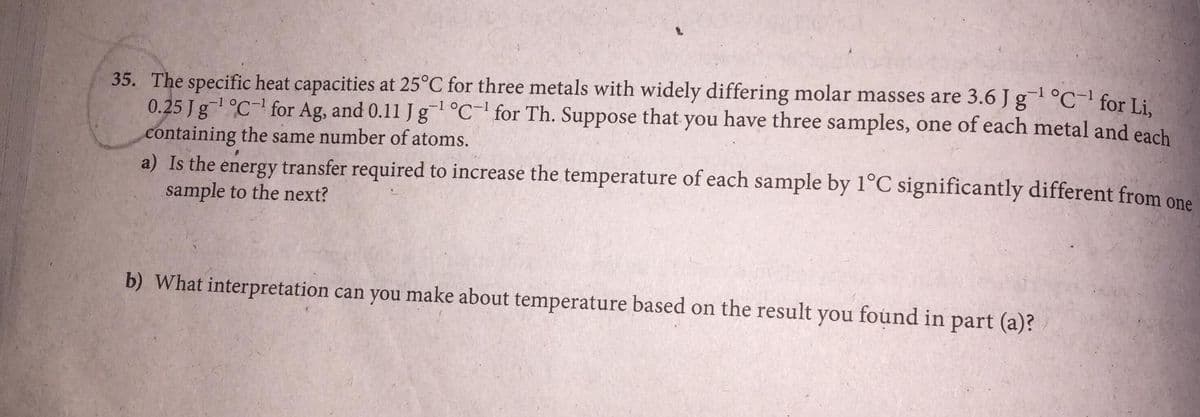-1 35. The specific heat capacities at 25°C for three metals with widely differing molar masses are 3.6 J g°C-1 for Li. 0.25 JgC for Ag, and 0.11 J g°Cfor Th. Suppose that you have three samples, one of each metal and each containing the same number of atoms. a) Is the energy transfer required to increase the temperature of each sample by 1°C significantly different from one sample to the next? b) What interpretation can you make about temperature based on the result found in part (a)? you
-1 35. The specific heat capacities at 25°C for three metals with widely differing molar masses are 3.6 J g°C-1 for Li. 0.25 JgC for Ag, and 0.11 J g°Cfor Th. Suppose that you have three samples, one of each metal and each containing the same number of atoms. a) Is the energy transfer required to increase the temperature of each sample by 1°C significantly different from one sample to the next? b) What interpretation can you make about temperature based on the result found in part (a)? you
Chemistry: The Molecular Science
5th Edition
ISBN:9781285199047
Author:John W. Moore, Conrad L. Stanitski
Publisher:John W. Moore, Conrad L. Stanitski
Chapter4: Energy And Chemical Reactions
Section: Chapter Questions
Problem 4.CCP
Related questions
Question
100%
Please refer to the attached photo. Thanks!

Transcribed Image Text:35. The specific heat capacities at 25°C for three metals with widely differing molar masses are 3.6 J g °C-' for Li.
0.25 Jg°C- for Ag, and 0.11 J g°C- for Th. Suppose that you have three samples, one of each metal and each
containing the same number of atoms.
a) Is the energy transfer required to increase the temperature of each sample by 1°C significantly different from one
sample to the next?
-1 o
b) What interpretation can you make about temperature based on the result you found in part (a)?
Expert Solution
This question has been solved!
Explore an expertly crafted, step-by-step solution for a thorough understanding of key concepts.
Step by step
Solved in 2 steps

Knowledge Booster
Learn more about
Need a deep-dive on the concept behind this application? Look no further. Learn more about this topic, chemistry and related others by exploring similar questions and additional content below.Recommended textbooks for you

Chemistry: The Molecular Science
Chemistry
ISBN:
9781285199047
Author:
John W. Moore, Conrad L. Stanitski
Publisher:
Cengage Learning

Principles of Modern Chemistry
Chemistry
ISBN:
9781305079113
Author:
David W. Oxtoby, H. Pat Gillis, Laurie J. Butler
Publisher:
Cengage Learning

Chemistry: An Atoms First Approach
Chemistry
ISBN:
9781305079243
Author:
Steven S. Zumdahl, Susan A. Zumdahl
Publisher:
Cengage Learning

Chemistry: The Molecular Science
Chemistry
ISBN:
9781285199047
Author:
John W. Moore, Conrad L. Stanitski
Publisher:
Cengage Learning

Principles of Modern Chemistry
Chemistry
ISBN:
9781305079113
Author:
David W. Oxtoby, H. Pat Gillis, Laurie J. Butler
Publisher:
Cengage Learning

Chemistry: An Atoms First Approach
Chemistry
ISBN:
9781305079243
Author:
Steven S. Zumdahl, Susan A. Zumdahl
Publisher:
Cengage Learning


Chemistry
Chemistry
ISBN:
9781305957404
Author:
Steven S. Zumdahl, Susan A. Zumdahl, Donald J. DeCoste
Publisher:
Cengage Learning

Chemistry by OpenStax (2015-05-04)
Chemistry
ISBN:
9781938168390
Author:
Klaus Theopold, Richard H Langley, Paul Flowers, William R. Robinson, Mark Blaser
Publisher:
OpenStax